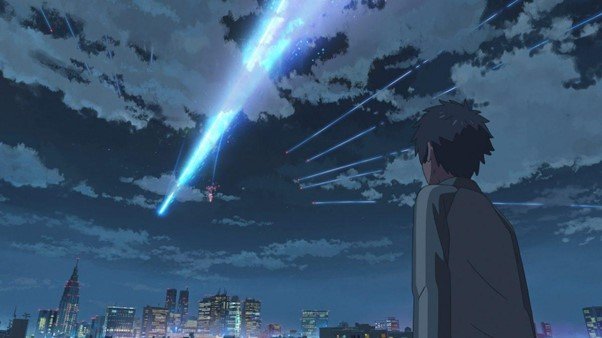A Journey through Shinkai's Anime Universe: Exploring Everyday Life, Confronting Disasters, and Discovering Hope from 'Your Name' to 'Suzume'
By Sammi Li
Welcome to the captivating world of Makoto Shinkai's films, where stunning visuals meet profound storytelling.
If you’re familiar with Miyazaki, what about the new Miyazaki? Your name, the anime blockbuster that positioned Shinkai as a potential successor to the legendary animator, is now the third-largest film in Japan based on domestic gross, trailing only behind Demon Slayer the Movie: Mugen Train and Spirited Away. How did this happen? Join me on a journey through the defining themes of Shinkai’s cinematic universe: the everyday, disasters, and, above all, the pursuit of hope.
Taki and Mitsuha in the opening scene of ‘Your Name’
Your name opens with Taki (Ryunosuke Kamiki/Michael Sinterniklass) and Mitsuha (Mone Kamishiraishi/Stephanie Sheh) describing the stars which are cascading from the sky: “It was almost as if a scene from a dream. Nothing more, nothing less than a beautiful view.” This scene also highlights Shinkai’s exceptional animation quality, characterized by bold and flat characters set against finely detailed backdrops, showcasing a thrilling attention to detail. The image of a comet hurtling towards Earth creates a beautiful contrast between the brightly shining sun on the horizon and the darker ground and cities below.
The opening comet that falls through the sky
His depiction of the magic hour and breath-taking countryside landscapes contribute to the film's stunning aesthetic. And even the sprawling metropolis of Tokyo appears both realistic and surreal under Shinkai’s direction, with finely detailed backdrops that represent real-life locations.
The first view of Tokyo
Indeed, in an interview, Shinkai revealed that he visited these locations beforehand, showing his commitment to capturing every nuanced detail of Tokyo, making it authentically lifelike. This obsession with creating a photorealistic depiction of Tokyo also sheds light on another theme prevalent in his films — the exploration of everyday life. In another interview, he recalled one of his earliest influences from Japanese contemporary authors like Haruki Murakami, who captured the essence of everyday existence and "accepted life as it is.”
This can be seen in his latest film, Suzume, where he delves into the concept of ruins as symbolic wounds and scars of the country. The film takes the form of a road trip adventure, exploring various locations throughout Japan. Shinkai uses Suzume as a lens through which to examine the current state of Japan – a nation prone to earthquakes and grappling with a decline in population. As Japan's population plummets, leaving homes abandoned (known as "akiyas" in Japan), the film captures the prevailing feeling of emptiness and loss. This sensation and perception that something has disappeared then mirrors the reality of modern Japan. Suzume shows that disasters can also become part of everyday life.
The Great East Tohoku earthquake of 2011 is the largest earthquake ever recorded in Japan. It caused massive devastation to the country, especially as it triggered an ensuing tsunami and a nuclear disaster at the Fukushima Daiichi nuclear plant; thousands had to evacuate their homes. This disaster had a profound impact on Shinkai’s approach to filmmaking, prompting him to recognize the omnipresence of disasters in our surroundings. Despite not being a firsthand victim, he translated this feeling of sudden uprooting from peaceful daily lives into his animations, from Your Name to Weathering with You and finally, Suzume.
In Your name, there is a line explicitly recounting the fear and instability associated with the potential loss of normal everyday life: “You never know, Tokyo might go tomorrow”. The idea that “Japan is living next door to disaster” is further explored in Suzume, which takes a more direct approach to depicting how the main characters confront disaster throughout the entire film. When young Suzume (Nanoka Hara/ Nichole Sakura) walks in the aftermath while searching for her mom, Shinkai recalls that the scene is inspired by memories of the victims of the 2011 earthquake — people wandering amidst the nothingness, desperately looking for their loved ones. In addressing this feeling of loss, Shinkai answers that the importance lies in “our minds and heart” to get through difficulties. Throughout Suzume’s journey, she encounters many people who are kind to her — offering hugs, clothes, and assistance along the way. The strength derived from these acts of communication and kindness propels her forward, ultimately leading her to confront herself. This is similar to the way we often reassure ourselves, saying, "Hey, it's okay. Things will get better in the future."
Or rather, the answer already lies in his film, with its underlying positive energy and hope. In the final scene, Suzume gives her younger self the three-legged chair in the Ever After, against the backdrop of rotating stars and a transition from night to day. After experiencing a prolonged journey of disasters, losses, kindness, and hope, it gives Suzume the strength to finally step out of her childhood trauma, to transfer this hope she has received throughout the film to comfort herself, the victims of the earthquake, and everyone who faces challenges in life.
Suzume tells her younger self, “No matter how sad you are now, you’re going to grow up. The future is not that scary. You will meet a lot of people you care for, and you’ll meet lots of people who will care for you too. The night might seem endless right now. But one day, the morning will come. You’ll grow up basking in that light. I’m sure of it. It’s written in the stars.”
If there is any takeaway from Shinkai’s films, it is a life lesson on how we can co-exist in a world filled with disasters, always susceptible to being displaced at any given moment, and despite all this, how we can overcome such challenges and find our light and hope amidst a looming darkness.
References:
https://lwlies.com/interviews/makoto-shinkai-your-name/
https://variety.com/2023/film/news/suzume-makoto-shinkai-anime-1235583487/
ST.ART does not own the rights to any images used in this article.





